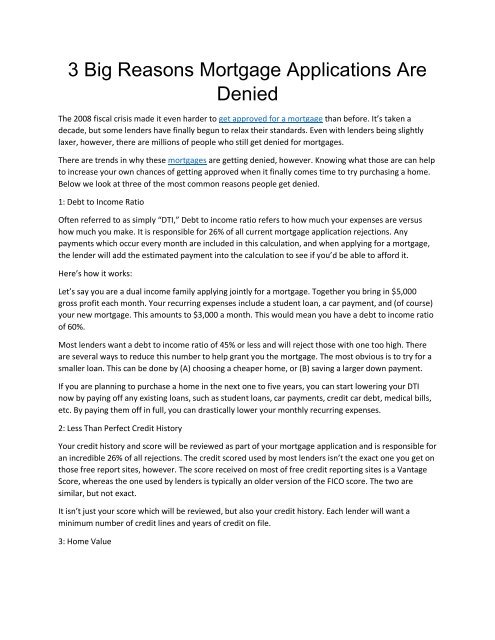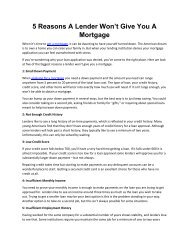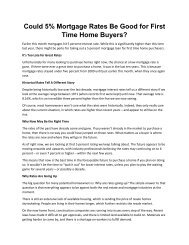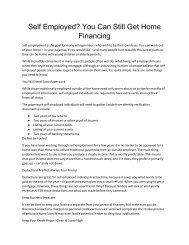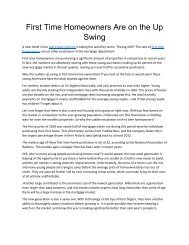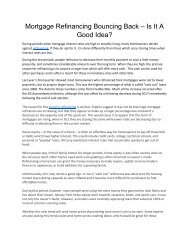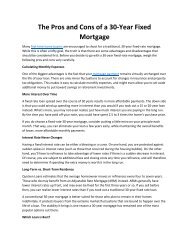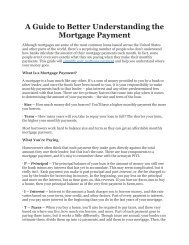3 Big Reasons Mortgage Applications Are Denied
The 2008 fiscal crisis made it even harder to get approved for a mortgage than before. It’s taken a decade, but some lenders have finally begun to relax their standards. Even with lenders being slightly laxer, however, there are millions of people who still get denied for mortgages. Visit: http://www.ratewinner.com/
The 2008 fiscal crisis made it even harder to get approved for a mortgage than before. It’s taken a decade, but some lenders have finally begun to relax their standards. Even with lenders being slightly laxer, however, there are millions of people who still get denied for mortgages. Visit: http://www.ratewinner.com/
You also want an ePaper? Increase the reach of your titles
YUMPU automatically turns print PDFs into web optimized ePapers that Google loves.
3 <strong>Big</strong> <strong>Reasons</strong> <strong>Mortgage</strong> <strong>Applications</strong> <strong>Are</strong><br />
<strong>Denied</strong><br />
The 2008 fiscal crisis made it even harder to get approved for a mortgage than before. It’s taken a<br />
decade, but some lenders have finally begun to relax their standards. Even with lenders being slightly<br />
laxer, however, there are millions of people who still get denied for mortgages.<br />
There are trends in why these mortgages are getting denied, however. Knowing what those are can help<br />
to increase your own chances of getting approved when it finally comes time to try purchasing a home.<br />
Below we look at three of the most common reasons people get denied.<br />
1: Debt to Income Ratio<br />
Often referred to as simply “DTI,” Debt to income ratio refers to how much your expenses are versus<br />
how much you make. It is responsible for 26% of all current mortgage application rejections. Any<br />
payments which occur every month are included in this calculation, and when applying for a mortgage,<br />
the lender will add the estimated payment into the calculation to see if you’d be able to afford it.<br />
Here’s how it works:<br />
Let’s say you are a dual income family applying jointly for a mortgage. Together you bring in $5,000<br />
gross profit each month. Your recurring expenses include a student loan, a car payment, and (of course)<br />
your new mortgage. This amounts to $3,000 a month. This would mean you have a debt to income ratio<br />
of 60%.<br />
Most lenders want a debt to income ratio of 45% or less and will reject those with one too high. There<br />
are several ways to reduce this number to help grant you the mortgage. The most obvious is to try for a<br />
smaller loan. This can be done by (A) choosing a cheaper home, or (B) saving a larger down payment.<br />
If you are planning to purchase a home in the next one to five years, you can start lowering your DTI<br />
now by paying off any existing loans, such as student loans, car payments, credit car debt, medical bills,<br />
etc. By paying them off in full, you can drastically lower your monthly recurring expenses.<br />
2: Less Than Perfect Credit History<br />
Your credit history and score will be reviewed as part of your mortgage application and is responsible for<br />
an incredible 26% of all rejections. The credit scored used by most lenders isn’t the exact one you get on<br />
those free report sites, however. The score received on most of free credit reporting sites is a Vantage<br />
Score, whereas the one used by lenders is typically an older version of the FICO score. The two are<br />
similar, but not exact.<br />
It isn’t just your score which will be reviewed, but also your credit history. Each lender will want a<br />
minimum number of credit lines and years of credit on file.<br />
3: Home Value
If the home you hope to purchase isn’t worth the amount of the loan, the bank will not approve your<br />
mortgage. Responsible for 17% of rejections, your new home (as scary as it sounds) is collateral in the<br />
event you don’t repay your loan.<br />
To find out how much your new home is worth, the bank will hire an independent appraiser. They will<br />
look at both the property and current sales trends of comparable homes in that general locale. For more<br />
mortgage info please visit http://www.ratewinner.com.


